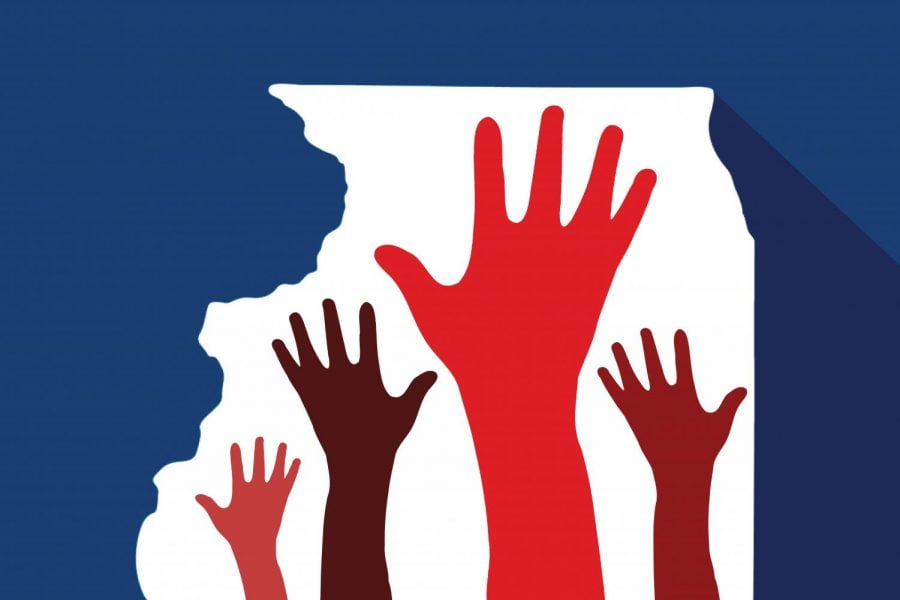Indivisible Evanston panel discusses outreach to under-represented voters
Daily file illustration by Catherine Buchaniec
Indivisible Evanston’s May meeting centered the best practices for political organizing and community outreach, especially to under-represented groups.
May 12, 2021
City Clerk Stephanie Mendoza discussed the importance of involving underrepresented voting blocs in grassroots, political organizing at a Tuesday Indivisible Evanston panel.
“Representation matters,” Mendoza said. “The best way to create new organizers is to just simply give people the opportunity and teach them.”
The event was hosted by the Evanston branch of grassroots organization Indivisible, which uplifts progressive legislation through member meetings, phone banking and letter writing campaigns.
The branch’s co-leaders, Rosie Rees and Candace Davis, moderated the event, which focused on best practices for mobilizing residents, especially those from marginalized communities, to vote in the 2022 Congressional midterm elections.
Alex Morgan, the executive director of the Progressive Turnout Project, said relational organizing, a community mobilization strategy in which people reach out directly to their family and friends, is essential in getting out the vote.
The Progressive Turnout Project, the largest national voter contact organization in the U.S., designs and tests voter turnout programs targeting “inconsistent” Democratic voters. Morgan said recent community mobilization efforts, such as Sen. Jon Ossoff’s utilization of the grassroots canvassing app Reach throughout his campaign, proves the need for increased research on relational organizing’s impacts.
“It’s great to have a face-to-face conversation,” Morgan said. “It’s even better if it’s with somebody that you know and trust.”
Mendoza shared this sentiment, emphasizing the value in intentionality when reaching out to underrepresented communities.
When she started working for Evanston Latinos as the director of community outreach, Mendoza said the city’s Latino communities did not have many places to meet or comprehensive programming directed toward Latino residents. She highlighted the importance of gathering in existing spaces, such as local restaurants, to organize.
“It’s been pretty much (about) meeting people where they are,” she said.
Mendoza also stressed language accessibility in political organizing material, especially when volunteers reach out to communities whose primary language is not English. She said all aspects of organizing, including written materials, events and social media posts, should be translated to dismantle language barriers.
Mendoza emphasized that people from all educational backgrounds should be able to read organizing materials and know how to get involved. Ultimately, she said, organizing should be accessible for as many people as possible.
“We want to make sure that whatever you’re trying to communicate…anybody can read it,” she said.
Some voting barriers have become especially apparent during COVID-19, when political organizing moved online, preventing traditional, in-person organizing.
Indivisible Evanston is currently working on a postcard campaign with Postcards to Swing States, where volunteers can write messages to Democratic voters in states with key 2022 Senate races.
Morgan said these postcard campaigns and other outreach methods like phone banking can be more effective than in-person canvassing in simultaneously reaching densely urban and isolated rural communities. Though volunteers can’t ring everybody’s doorbell, he said, people can be reached by mail or phone.
Weinberg junior and Center for Civic Engagement fellow Haley Dudzinski spoke about NU Votes’ pivot toward increased online resources during remote learning.
The initiative expanded its virtual voter services tool, which helps students register to vote and request mail-in ballots. During the 2020 election, the group also hosted Zoom office hours dedicated to answering students’ questions about the voting process.
“(As) college students, we often feel left out. Messaging is often not targeted toward us,” Dudzinski said. “It’s quite easy to feel alienated and also afraid to ask questions.”
But these experiences of election exhaustion aren’t unique to voters. During the Q&A portion, Davis acknowledged the exhaustion that can come with volunteering, especially as Indivisible Evanston programming ramps up for the 2022 midterm elections.
In response, Morgan said the organizing process is not a sprint.
“I would just encourage you to take your work in stride,” he said. “Take care of yourself and do what you can in 2021 because we need your full force in 2022.”
Email: jorjasiemons2024@u.northwestern.edu
Twitter: @JorjaSiemons
Related Stories:
— Everything Evanston: Indivisible Evanston Pivots Amid Pandemic
— Indivisible Evanston talks mobilizing behind the Biden campaign
— Voter outreach and registration efforts will look different this election, NU Votes says



